SEVILLE, Spain – For decades, it was easy to admire Aston Martins from afar for their instantly recognizable styling and glorious noises from their eight- or 12-cylinder engines. From the driver’s seat, however, past models have been a bit of a disappointment, with blatant parts sharing from the dark days of Ford ownership to shoddy workmanship and performance that wasn’t as trustworthy or predictable as rivals.
Thankfully, Aston Martin has made significant improvements this decade, with a closer partnership with Mercedes-Benz and a renewed focus on quality control. That alone is worth celebrating, but after sampling the 2025 Aston Martin Vantage in Spain, I find myself positively giddy.
While the 2025 Vantage can’t technically be considered all-new, it has so many upgrades and changes that it is fundamentally different from its predecessor. Aston reworked the hand-built, Mercedes-Benz-sourced twin-turbo 4.0-liter V8 with bigger turbos, more cooling, modified cam profiles and altered compression ratios, bringing output to 656 horsepower and 590 pound-feet of torque. That’s way up from the last version’s standard 503 hp and 505 lb-ft (the F1 Edition produced 528 hp). The eight-speed ZF automatic transmission’s shift calibration was updated for punchier in-gear acceleration, but it still sends all that power to the rear wheels only. Hell. Yes.
The downside, if you can actually call it that, of sticking with rear-wheel drive is that the considerably more powerful new Vantage only picks up a tenth of a second from 0-60 mph to 3.4 seconds. There’s only so much rear tires alone can do when launching such a big-powered car. Besides, it’s not uncommon for vehicles to put down such impressive acceleration numbers nowadays. The new Vantage is ultimately far more impressive in the way it corners, dramatically transforming its character and giving it a playful personality that has been missing from the Aston Martin stable.
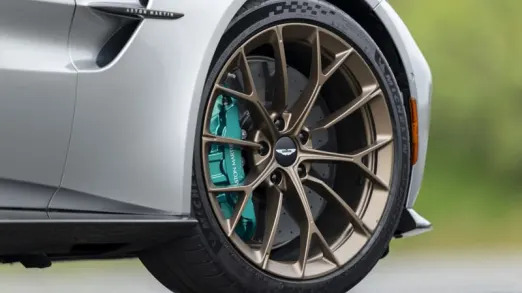
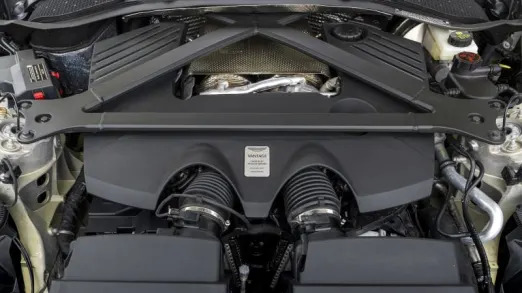
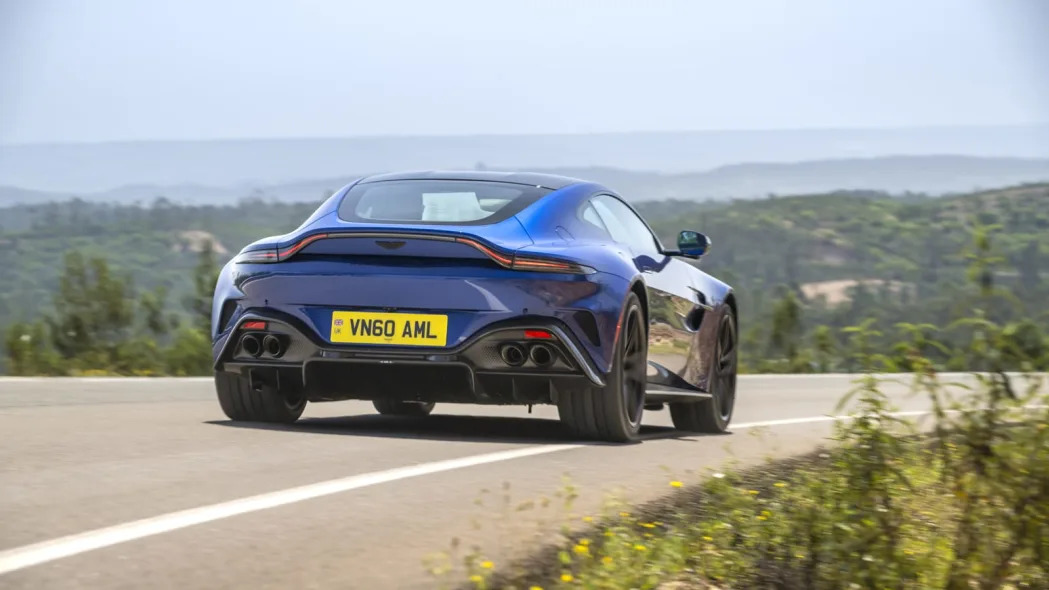
On the twisting scribble of roads north of Seville, the Vantage was unlike any Aston Martin I’ve driven. It felt consistent in all of its reactions, instilling a high level of trust as I bounded from side to side. The narrow roads and blind turns kept me from fully unleashing its full performance potential, plus the route ended at the Circuito Monteblanco racetrack where I sampled the Porsche Taycan GT a few weeks prior.
It became immediately apparent that the Vantage is positioned squarely in the sports car spectrum. The ride quality is firm, there’s a noticeable amount of road noise, and the V8 growls with satisfying ferocity. I’d estimate it’s just a bit too raucous for most drivers, and for them, the DB12 ground tourer would be a more appropriate choice. For myself and a minority of drivers, the Vantage strikes a delicate balance between all-out performance and just enough comfort to make it livable.
In the Sport Plus drive mode, the automatic transmission expertly downshifts right where I’d normally command one from the paddles. Likewise, it keeps the twin-turbo V8 high into the rev range. I still preferred going fully manual with the large paddles, though, and the Vantage benefits from quick and smooth shifts. The gear ratios are well-spaced to keep an abundance of power ready and I later realized that there was more than enough torque on hand that I could have just kept the car in third to pull me out of certain curves instead of swapping down an extra cog to second.
The Vantage demands more effort and concentration from the driver than many other vehicles and rewards you with predictably glorious performance. You’ll feel a connection to the road surface, feeling every bump and undulation, but it’s not harsh or nervous. Mid-corner bumps won’t send the car spinning off a cliff and after a few hours, I didn’t feel as though the suspension was beating me up.
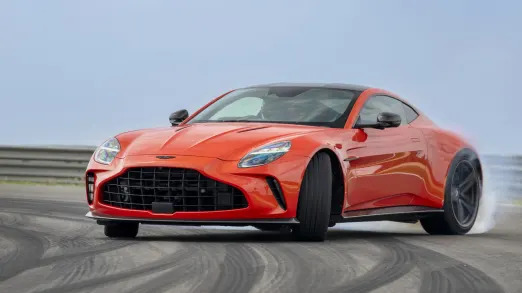
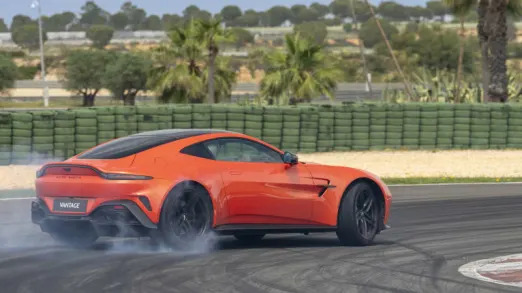
This new Vantage is easily the best roadgoing Aston Martin I’ve driven and its excellence was further accentuated on a racetrack. In a variety of conditions ranging from steady rain to fully dry, I was allowed a generous amount of laps around Circuito Monteblanco. I cautiously set out in the rain while selecting the Wet drive mode. Not surprisingly, it required plenty of throttle restraint to keep the rear tires in line, but even when I intentionally overcooked it coming out of some turns, the system allowed some wheelspin as the tail rotated towards the outside. It wasn’t until I was well out of shape, or I corrected with the steering and throttle, that the traction and stability control intervened.
As the track dried out, my confidence grew as I selected the Sport Plus drive mode. With it, the Bilstein dampers firm up, engine response is sharpened, and the electronic nannies get much more permissive. On the front straight, the acceleration was relentless as quick gear shifts barely interrupted the power. Tempting fate, I jammed on the brakes a little deeper than before and the back end gave me the subtlest of wiggles. I was about a car-length’s too late on the brakes, but managed to rotate the Vantage with a hint of steering as I trailed the pedal down to the apex. Over the next rise, I stayed in the throttle to get the back end dancing yet again.
Thanks to a perfect 50/50 weight distribution, it’s easy to get this sports coupe pointed where you want. At the same time, it’s not skittish or oversensitive, allowing for plenty of perceived time to recover from either under- or oversteer. The active suspension, electronic rear differential, and tons of additional chassis strengthening all contribute to the Vantage’s enhanced athleticism, and thankfully they don’t detract from its wildly entertaining dynamics.
In addition to the pre-selected drive modes, you can also fine tune how much intervention the traction and stability control exert (the instrument panel display is shown below). On a scale from one to nine, with nine completely disabling control, you can incrementally creep up on your preferred level.
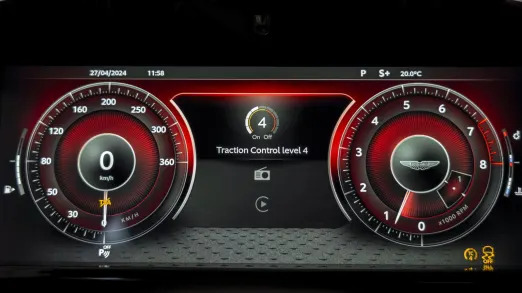
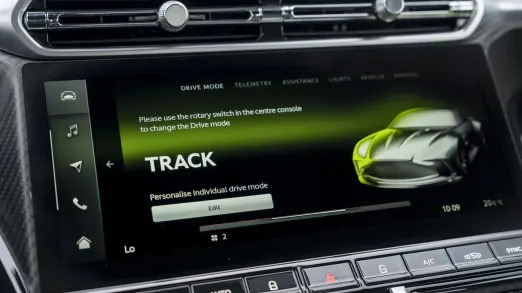
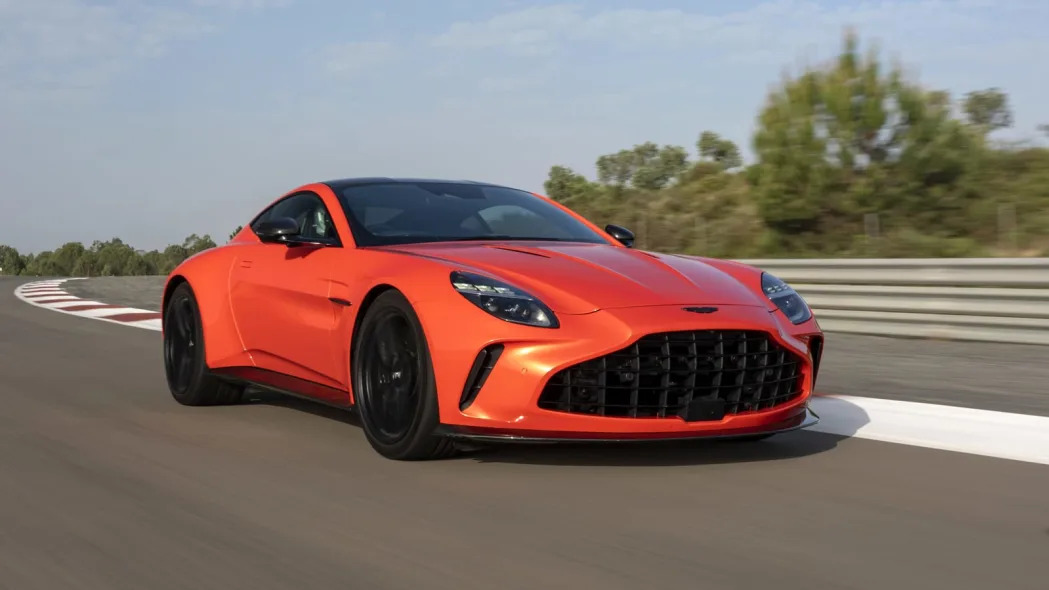
After wringing out the Vantage lap after lap, the brake pedal began to soften but remained effective at slowing the car enough from 160 mph-plus down into second gear to make turn one. The front tires also began to overheat near the end of the session, as demonstrated by a bit more pronounced understeer as well as the instrument panel display that shows each individual tire temp.
Eventually, I got the call for some cool down laps and to return to the pits. I exited the Vantage a sweaty hot mess but fully invigorated, leaving me to only admire the sleek coupe as a spectator. And admire it I did. While I was already drawn to the previous Vantage’s styling, the refreshed 2025 model adds an appropriate amount of visual aggression to match its newfound performance. It also brings it more in line visually with the DB12 rather than James Bond’s never-made DB10.
A much larger grille gives the impression that this beast needs to inhale a ton of air to perform as the carbon fiber splitter hovers just above the pavement. Side strakes on either side of the grille break up some of the predecessor’s visual bulk while larger, Valkyrie-inspired headlights tie the whole front fascia together. Sharp creases in the hood and sides taper back into the bodywork gracefully, as though they were initially sketched as bold brushstrokes that accentuate forward motion. From the back, the prominent flip-up rear spoiler and thin taillights further distinguish the Vantage from any other vehicle on the road.
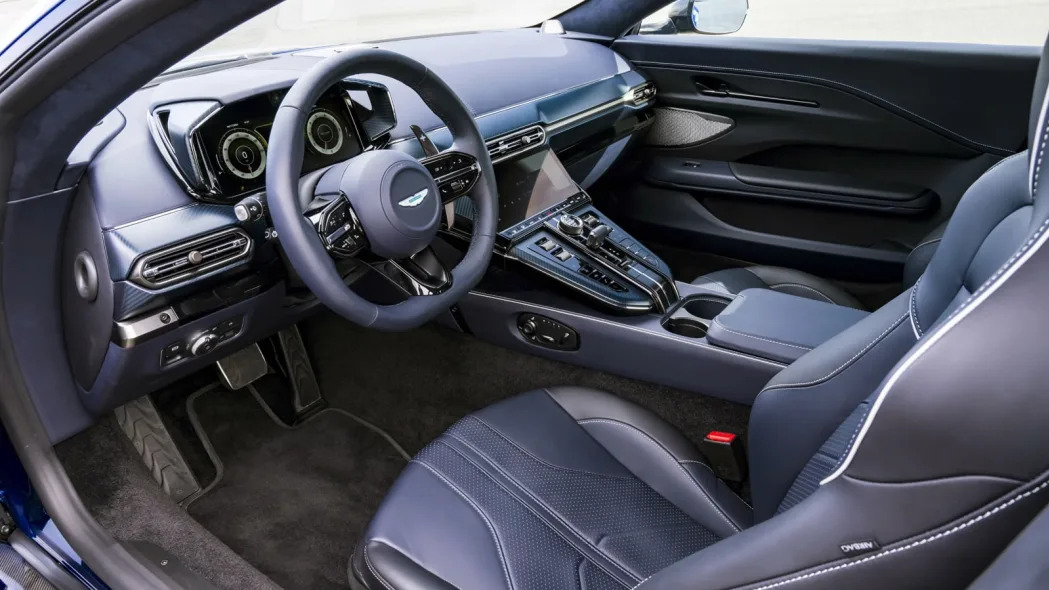
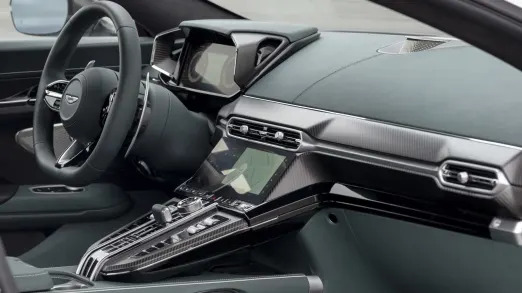
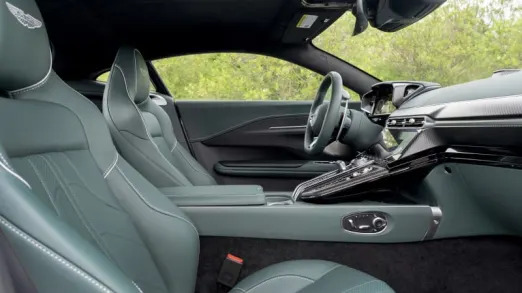
The interior also sees some major improvements. The dashboard has been redesigned to look more cohesive, with better integrated air vents and more space-efficient controls. The infotainment system is now controlled by a 10.25-inch touchscreen versus the original non-touch display operated by an outdated Mercedes knob/touchpad user interface. The screen has also been relocated to lower in the center stack.
This new infotainment system is now competitive with rivals, though it lacks some of the more sophisticated voice recognition and navigation features found in newer vehicles. The display also poses some challenges when driving as the on-screen buttons can be rather small and difficult to accurately push when driving. With the screen lower on the dash, it also requires taking your eyes of the road to operate. Considering the Vantage’s positioning as a legitimate sports car, I’m willing to be less critical of the infotainment layout, but there’s certainly still room for improvement.
The center stack and console have also gotten a major makeover. A simple toggle lever replaces the previous mess of individual gear selector buttons and is flanked by several attractive knurled metal roller dials for climate and entertainment control. Altogether, they make for a more attractive and usable cockpit, apart from a continued lack of storage. On the plus side, the trunk can hold up to 12.2 cubic-feet of cargo, which is big enough to comfortably squeeze two carry-on roller bags and then some.
Interior materials and build quality are no longer an issue, as premium leather, carbon fiber, and suedecloth cover almost every surface. There’s also a good, solid feel with the underlying construction, with no detectable creaks or squeaks from the panels. It’s a massive improvement over Aston Martins from a decade ago and now meets expectations for such an expensive coupe.
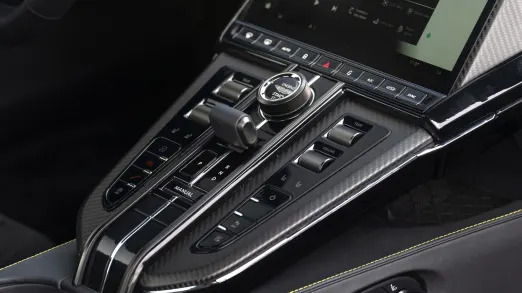
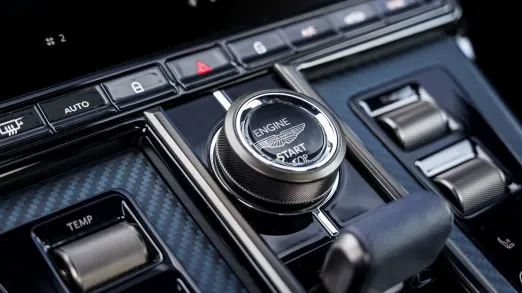
And let’s talk about that price. The 2025 Vantage starts at $194,400 (including $3,400 in destination fees). Ouch. That’s almost $40,000 more than the previous model year, and even then, it was a hefty sum for an “entry-level” Aston Martin. Is it 40-grand better? Yes. Emphatically yes. This refresh is significant enough to warrant calling it a new generation and the improvements are noticeable in every aspect.
In the $200,000 range, the Vantage will have to contend with the sharp end of the Porsche 911 lineup where the GT3 and Turbos reside, though any 911 lacks the sense of occasion the Aston Martin has. The McLaren Artura is another high-performance alternative, but its mid-engine layout reduces convenience. On the horizon, the new Mercedes-Benz AMG GT could be worth holding out for.
If your tastes steer you toward more comfortable grand touring, the new Aston Martin DB12 should fit that role while gaining a massive power bump and sharper handling itself for the latest DB generation. There’s also the recently reworked Maserati Gran Turismo for a distinctly Italian flair.
While past Aston Martins were fully capable of turning heads with their gorgeous styling and boisterous soundtracks, this new Vantage adds some much-needed substance and sophistication. It’s now worthy of going toe-to-toe with top sports coupes in every metric.
